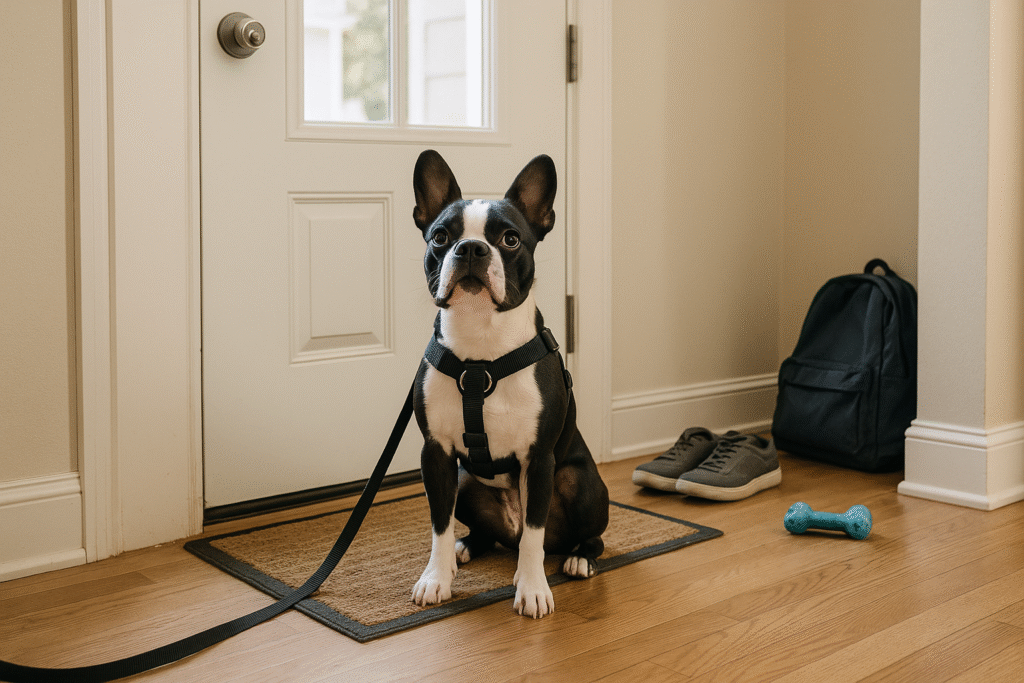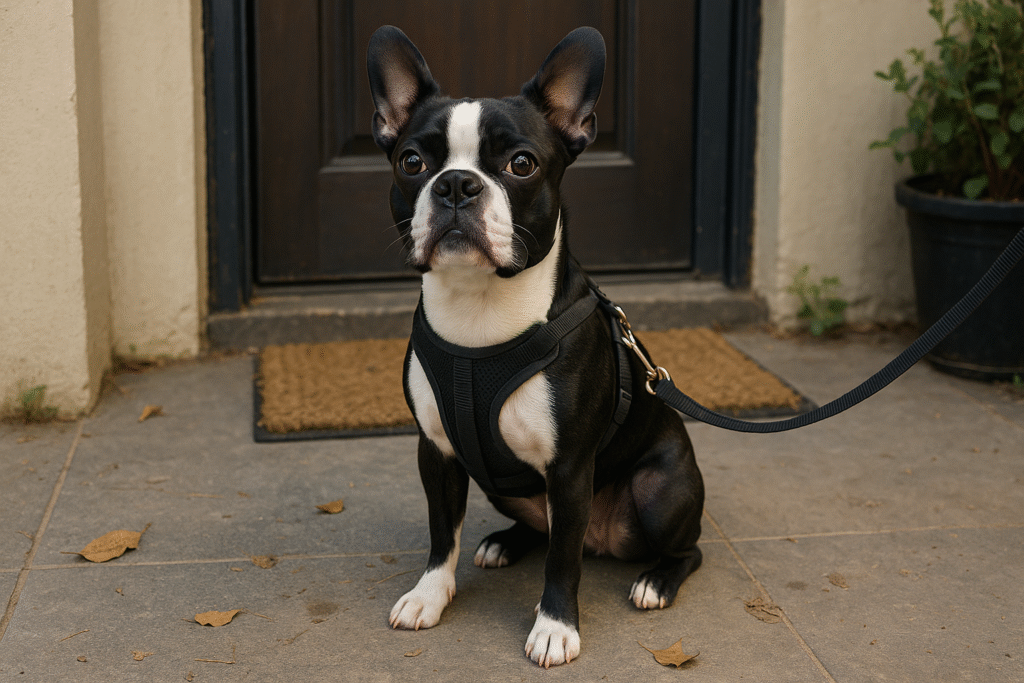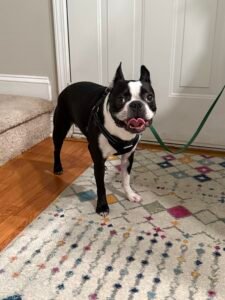Let’s get real for a second: When I brought Dumpling home, I thought, “How hard can this be? Boston Terriers are smart, right?” Cue three surprise puddles, a midnight dash to the bathroom, and a mysterious little “gift” hidden under the dining table. Let’s just say — there’s no such thing as a “failsafe” breed!
Expert says:
“House training a Boston Terrier is an essential step to ensure a happy life with your new pup. Boston Terriers are intelligent and eager to please, which generally makes them highly trainable. However, like all small breeds, they have fast metabolisms and smaller bladders – meaning more frequent potty breaks are needed, especially when they are young.”
This guide will give you:
- The real differences with Boston Terriers — why their small size and big attitude make house training unique
- A totally honest timeline: when you’ll start seeing progress, and why not to panic if it’s slow
- Must-have gear that actually makes a difference (Amazon links, too!)
- The most detailed, human-first, step-by-step plan you’ll find
- My personal wins, fails, hacks, and stories from training Dumpling
- Pro tips and real quotes from top US sources (AKC, Dogster, Boston Terrier Society, and more — with verified working links)
- Solutions for those “regression” moments (spoiler: every puppy has them)
- Common mistakes and how to avoid them, because I’ve made plenty!
When Should You Start House Training?

The golden rule: Start the very first day your Boston comes home — usually around 8 weeks old.
Expert tip:
“Puppies are capable of learning bathroom habits at a very young age, and starting early helps instill good habits before bad ones form… Consistency and patience are key throughout this process.”
— AKC
Real talk:
- Don’t wait for your pup to “settle in” — the longer you delay, the harder it gets to break bad habits.
- The same goes for adopted adult Bostons: treat them like puppies, and you’ll see progress even faster (their bladders are bigger!).
- Not sure where to start? Just start — routine and rewards work at any age.
The Boston Terrier Difference
- Tiny bladders, turbo metabolism:
Expect more frequent potty breaks than you’d ever believe. My Dumpling needed to go every 1–2 hours at 3 months old. - Sensitive souls:
Boston Terriers pick up on your mood fast — positive vibes and encouragement only! - Fast learners — if you make it fun:
House training becomes a “quest” or a game. Bostons love this approach. - Regression is normal:
If your Boston suddenly “forgets everything” at 6–8 months, you’re not alone — it’s totally normal. Just stick to the plan.
Essential Supplies for House Training (Tested & Recommended)
- Crate:
A crate is a game changer (I used the MidWest 24-inch folding crate with a divider — perfect for growing pups). - Puppy pads (if needed):
For apartment dwellers or during bad weather. Try to use as a temporary solution only. - High-value treats:
Small, soft, and irresistible — the “secret sauce” for quick progress. - Potty bell:
Dumpling learned to ring a bell to go outside in a week! - Enzymatic cleaner:
Trust me, you need this. Rocco & Roxie Stain & Odor Eliminator has saved my rugs more than once. - Baby gates/playpen:
Manage the freedom! Limited space = fewer accidents.
Why Routine is Everything
Key routine tips:
- Feed at set times — it regulates the potty schedule. For more on the best diet and feeding tips, check out my guide to the best food for Boston Terriers.
- Go outside after every nap, meal, or play session. Yes, really.
- With puppies: out every 1–2 hours. At night, be ready for a midnight potty run.
- Celebrate every win — treats, praise, silly happy dances. Bostons love attention!
Step-by-Step: My Real-World Boston Terrier Potty Training Plan
BOSTON TERRIER POTTY TRAINING
— 5 REAL-WORLD STEPS —
YOUR SPACE
- Choose a safe, quiet area
- Add soft bedding and favorite toys
YOUR DAILY SCHEDULE
- Stick to a consistent routine
- Take outside after every meal
POTTY SPOT
- Lead your dog to the same spot
- Use a command like “Go potty”
A POTTY BELL
- Hang bell by the door
- Guide paw to ring before going out
A PRO
- Always reward within seconds
- Use excited, happy praise
How to Handle Accidents (Because They Will Happen)
- Never yell, scold, or “rub their nose in it.” Seriously, it just creates confusion and anxiety.
- If you catch your Boston in the act, interrupt gently — “Uh-oh! Outside!” — and immediately take them to their potty spot.
- If you find a mess after the fact: clean it up with an enzymatic cleaner and move on. Don’t make it weird.
- More accidents than successes? Restrict freedom and ramp up the routine. (I made this mistake and paid the price… literally, in carpet cleaner!)
Expert advice:
“Never punish your dog for accidents… make sure that doing their business outside is a hugely rewarding experience for your pup.”
— AKC
Boston Terrier-Specific Tips & Tricks
- Frequent breaks: Don’t compare your Boston to bigger breeds — their little bodies just need to go more often.
- Weather matters: Bostons can be picky about cold or rain. Invest in a little dog sweater and brave the elements!
- Playtime after potty: Letting them play outside after potty is a reward; if you play first, they might forget what they’re out there for.
- Regression happens: If your puppy “forgets everything” after months of success, just tighten up the schedule and stick with it. You’ll be back on track in no time.
- Medical check: If house training just isn’t sticking, check with your vet — sometimes UTIs or health issues are to blame.
Real Products That Actually Helped Us (Amazon Links Included)
These are the exact products I used with Dumpling during our house training journey — and I recommend them because they made a real difference. Yes, these are affiliate links, but I only vouch for what worked for my Boston Terrier in real life.
1. MidWest Homes for Pets Dog Crate, 24-Inch
If you’re only getting one thing, get a good crate! This MidWest crate was the perfect size for Dumpling as a puppy (and still works for him as an adult).
- Why it’s my pick: The divider lets you resize the space as your pup grows, so you don’t have to buy multiple crates. It’s easy to clean, has two doors (which is so convenient), and folds flat if you need to store it.
- Pro tip: A crate that’s too big will lead to accidents! Adjust the divider as your puppy grows.
- How I use it: I kept Dumpling’s crate in the living room so he was always near us. We made it a cozy “den” with a soft towel and a toy. It was never a punishment — just his safe, calm spot.
2. Amazon Basics Puppy Pads
Puppy pads aren’t for everyone, but they saved my sanity during the early days, especially when Dumpling was tiny or the weather was rough.
- Why it’s my pick: These pads are super absorbent, don’t leak, and come in a huge pack (so you don’t run out at the worst moment).
- How I use it: I always kept the pad in the same spot, so Dumpling knew exactly where to go if we couldn’t make it outside in time. As soon as we could, we transitioned to outdoor potty only.
3. Rocco & Roxie Stain & Odor Eliminator
If there’s one cleaning product every dog owner needs, it’s this.
- Why it’s my pick: It actually removes the smell — not just masks it. I tested a few, and this one worked best on carpets and floors. Even after a “puppy accident,” there was zero smell left behind.
- How I use it: Blot up what you can, spray generously, wait a few minutes, then wipe. The smell really disappears (even to a dog’s nose), which means fewer repeat accidents.
4. Mighty Paw Smart Bell
Teaching Dumpling to ring a bell when he needed to go out was honestly a game-changer.
- Why it’s my pick: Unlike the traditional jingly bells, this one’s easy to press (even for small paws), sticks right by the door, and doesn’t look ugly in your house.
- How I use it: Every time we went out, I’d press Dumpling’s paw on the bell, then immediately take him outside. Within a week, he started ringing it himself. Now I always know when he needs a bathroom break!
5. Zuke’s Mini Naturals Dog Treats
House training is all about instant rewards, and these are my absolute go-to treats.
- Why it’s my pick: Soft, tiny, and healthy — so you can give lots of rewards without worrying about calories. Dumpling would do ANYTHING for these!
- How I use it: I kept a handful in my pocket every time we went outside. The second Dumpling finished his business, he got a treat (and a party), and we transitioned to outdoor potty only.
6. Pet Playpen with Door
BIRDROCK HOME 12‑panel playpen with door comes pre‑assembled—no tools, no fiddling—and the panels snap together into any shape you need. Add in the secure latch door and non‑slip suction cups, and boom: a stable, adaptable space for Dumpling-in-training to play or rest.
- Why it’s my pick: The BIRDROCK HOME playpen is super easy to set up and can be shaped however you need, so it grows with your pup. The secure door and non-slip feet make it feel safe and sturdy.
- How I use it: I keep Dumpling’s playpen in the living room with a soft towel and a toy inside, so he has a cozy spot to nap or play while staying close to us. It’s his go-to place when I need him safe but not crated.
| Product | Purpose | Personal Experience / Recommendation |
|---|---|---|
| Puppy Pads | For puppies, accidents, and emergencies | Used them with Dumpling — they honestly saved us more than once |
| Potty Bells | Teach your dog to “ask” to go outside | Fun and surprisingly effective for communication |
| Enzymatic Cleaner | Quick cleanup, odor elimination | Instantly gets rid of the smell — total game changer |
| Training Treats | Positive reinforcement | Makes training so much more fun for both of us! |
| Crate | Safety, faster house training | Couldn’t have done it without a crate — it sped up the process a lot |
Final Thoughts (And a Personal Pep Talk)
House training a Boston Terrier isn’t always smooth sailing, but you will get there. I’ll be honest — it took me a solid month to get Dumpling mostly accident-free, and another month for total confidence. There were setbacks, there were triumphs, and there were more than a few early mornings spent outside in my pajamas. Would I do it all again? Absolutely. The payoff — a clean home, a happy pup, and that amazing “aha!” moment when they finally ask to go out on their own — is worth every paper towel and every treat.
Have questions? Your own funny Boston potty story? 👇 Drop a comment below!👇 If you found this helpful, please subscribe for more honest Boston Terrier guides, or share your own tips!
FAQ
-
How long does it actually take to house train a Boston Terrier?
On average, it takes most Boston Terrier puppies between three weeks and three months to become reliably house trained. Consistency, patience, and using positive reinforcement are the biggest factors. Remember, every Boston is an individual—some catch on quickly, while others may have more frequent accidents, especially if they’re easily distracted or still developing bladder control. Regression can also happen, so if your Boston seems to “forget” the rules for a few days, just stick to your routine and things will get back on track.
-
What should I do if my Boston Terrier keeps having accidents even after weeks of training?
If your Boston Terrier is still having accidents after several weeks, first double-check your schedule: are you taking them out often enough and rewarding them for every success? Sometimes, environmental stress or separation anxiety can set training back, especially if your pup is left alone for long periods. It’s important to rule out medical causes, like a urinary tract infection, but most often a renewed focus on routine, supervision, and lots of praise does the trick.
-
My Boston Terrier wags his tail like crazy before running to the door—does this mean he needs to go out?
Absolutely! Boston Terriers are expressive, and a sudden burst of tail wagging or excited spinning near the door is a strong signal that your dog needs a potty break. Over time, you’ll learn your dog’s unique cues—some Bostons whimper, others scratch, and many use their tails as a clear communication tool. Always act quickly on these signals to build trust and prevent accidents.
-
What is the 10-10-10 rule for potty training?
The 10-10-10 rule is a simple strategy some owners use when starting out with potty training a puppy. It suggests taking your puppy outside every 10 minutes after eating, drinking, or playing for the first 10 days, and then maintaining a structured schedule for at least 10 weeks. While it sounds intense, the main goal is to prevent accidents by providing lots of opportunities to go in the right place. It helps your puppy quickly connect the dots between needing to go and being outside. Over time, as your puppy grows and gains more control, you can gradually increase the interval between potty breaks. The early effort pays off with fewer mistakes and a much smoother house training journey.
-
How do I get my Boston Terrier to stop peeing in the house?
First, make sure your dog has a consistent schedule for meals, potty breaks, and playtime. Take your dog outside after waking up, after meals, after play, and before bedtime. If you catch your dog starting to go inside, calmly interrupt and bring them outside right away, then praise them for finishing in the right spot. Always clean up accidents thoroughly with a good pet-safe cleaner to eliminate any lingering scent. Avoid scolding or punishment, as it only leads to confusion. Be patient and persistent—sometimes it takes weeks, sometimes a couple of months, but with consistency, your dog will learn the right habits.
-
How do you discipline a Boston Terrier that doesn't listen?
When your Boston Terrier isn’t listening, focus on positive redirection instead of punishment. Gently guide your dog to the correct behavior and reward them when they do it right. If they ignore commands, try using more enticing treats, toys, or extra enthusiastic praise to get their attention. Training sessions should be short and upbeat, since dogs respond best to encouragement and clear signals. If you’re feeling frustrated, take a break rather than losing patience. Consistent, calm correction and lots of praise for good choices will help your dog understand what you expect.
-
How long should you discipline a Boston Terrier?
Discipline for dogs, especially a Boston Terrier, is really about teaching, not punishment. If your dog makes a mistake, correct it immediately with a gentle redirect, but don’t dwell on it. Training is a daily process, and learning happens over time—sometimes it takes a few days, sometimes several weeks, for new habits to stick. Remember that dogs live in the moment, so the most effective teaching happens right as the behavior occurs. The key is to stay calm and consistent and always follow up with encouragement when your dog gets it right.
-
What not to do with a Boston Terrier?
Never punish your Boston Terrier physically or shout at them, even when you’re frustrated. Avoid leaving your dog unsupervised for long periods while they’re still learning, as this can lead to unwanted accidents or destructive behaviors. Don’t give them too much freedom in the house until you’re sure they’re reliably trained. Don’t ignore early signs of stress or health issues if something suddenly changes in their behavior. Finally, don’t rush the process—house training and building good habits takes time, patience, and a lot of repetition.










